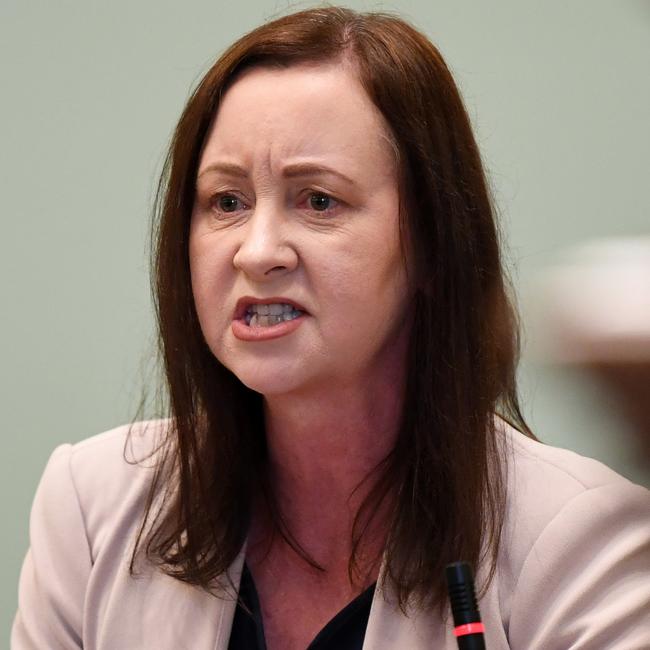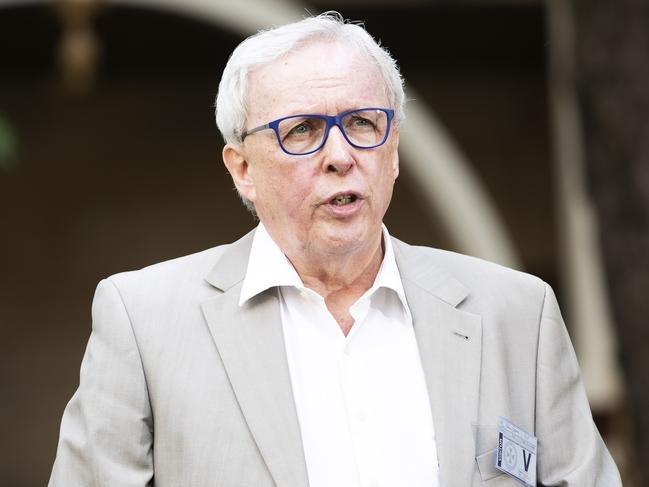New health inquiry to review Commonwealth responsibilities – not state
Health Minister Yvette D’Ath has announced a review that deals with pretty much everything except the state’s own responsibilities.
QLD Politics
Don't miss out on the headlines from QLD Politics. Followed categories will be added to My News.
The State Government has launched a health inquiry that will zero in on the problems plaguing Queensland’s under-pressure health system – but only the parts the Commonwealth is responsible for.
Hospital insiders were left gobsmacked yesterday by the terms of reference of the inquiry, which will look at how primary and allied health care, aged and NDIS care and private health impact on the state’s public health system.
ANALYSIS: Politically-driven health crisis inquiry a sick joke
It won’t review the state’s ramping crisis, its shortage of hospital beds, workforce planning concerns or the lack of mental health and palliative care services, which experts have wanted probes into for months.
The inquiry comes seven months after Health Minister Yvette D’Ath on Wednesday declared state and federal health systems needed broadscale reform in the face of “unsustainable” demand and called for cultural change in her own department.
But Ms D’Ath was unable to highlight substantial reforms taken since then, saying work to improve emergency department bed capacity, on hospital governance, on workforce planning, to recruit more mental health co-responders, and to expand the scope of work for nurses and pharmacists would take time.
“It’s not going to be done in a matter of three months, or six months,” Ms D’Ath told The Courier-Mail.
Defending the new review, Ms D’Ath said: “We already know what’s happening inside our hospitals, what we don’t have control of is what’s happening outside our hospitals that’s putting demand on our hospital system.”

“A large proportion of people who end up in hospital are ending up there from preventable diseases or conditions that are manageable in the primary sector,” she said.
“So that is such a major part of the pressures on health systems.”
Asked why she hadn’t initiated reviews called for previously, she said the government already knew about those problems and were working on the solutions.
Queensland Nurses and Midwives Union boss Beth Mohle said she’d ignore the terms of reference as “we’ll raise whatever we need to raise”.
Ms Mohle said she was particularly concerned about workforce planning for tired staff who hadn’t even dealt with the impending Delta wave yet.
She said the system, including funding models, was broken.
“It’s a complex picture. There’s no one answer,” Ms Mohle said.
“A lot of it is long-term structural change that has to happen and that has to happen with a discussion at a state and federal level.”
She said the “momentum” for reform being embraced earlier this year had been “lost” and “we need to be recapturing that sense of urgency”.
“Covid showed us a window of opportunity of what was possible,” she said.
“But it’s already going back to the way we always did things.”
AMAQ president Chris Perry welcomed any investigation into improving the health system, but said the State Government “do need to look at themselves”.
“This inquiry appears to be focusing on issues outside the state government’s control,” Dr Perry said.
“It must also investigate areas where the Queensland Government can make a difference to daily outcomes, including providing more hospital beds and staff.

“It should identify areas where the state and federal governments can work together to fix the ongoing problems facing our health system.”
Ambulance union UWU public sector director Sharron Caddie said she welcomed any inquiry but both state and federal government needed to enact solutions “plaguing the system” now.
“Issues including ramping, patients being cared for in corridors, staff being forced to regularly work in unsafe and chaotic conditions and strong concerns for patient and staff safety,” Ms Caddie said.
“We’re calling on the federal and state governments to commit to actions that are in the best interests of patient care and staff safety.”
Opposition health spokeswoman Ros Bates called it a “politically driven review”.
“Ambulance ramping is soaring, hospitals are falling into code yellows nearly every day, surgical waiting lists are blowing out, waiting lists for the waiting lists are reaching unprecedented levels and we have multiple public hospitals under a cloud of botched surgeries or procedures,” she said.
“Rather than being focused on fixing the health crisis, the Health Minister is using parliament to try and pass responsibility to everyone else but herself.”
More than 40 per cent of ambulance patients were sitting ramped at Queensland hospitals in the June quarter, with some hospitals nearly at 60 per cent.
And while all category-one patients were seen immediately, just 67 per cent of category two patients with imminently life-threatening conditions were seen within the 10-minute goal.
A spokesman for federal Health and Aged Care Minister Greg Hunt said the inquiry was “a clear and flagrant attempt by Queensland Labor to blame the Commonwealth for their own failure to appropriately invest in their own healthcare system”.




